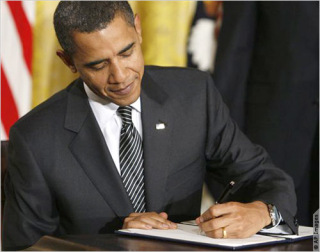President Obama is going to push Congress on a proposal that would overhaul NSA telephone surveillance, ending the bulk surveillance of all Americans and replacing it with a “new kind of court order” on individual surveillance. The program won’t happen soon, as officials say at least one more 90 day extension for the old system is coming. Obama was light on details, saying only that it would “alleviate privacy concerns.”
 Officials say the plan would have the NSA get the data from telephone companies, and then only if authorized by a judge under the terms of the new court orders. Ending the bulk surveillance is surely a good thing, but how good depends on how the court orders work.
Officials say the plan would have the NSA get the data from telephone companies, and then only if authorized by a judge under the terms of the new court orders. Ending the bulk surveillance is surely a good thing, but how good depends on how the court orders work.
That’s not so promising, if a new bill by Reps. Mike Rogers (R – MI) and Dutch Ruppersberger (D – MD) is anything to go on. This bill similarly aims to restrict “bulk” surveillance, but does so by making individual surveillance ridiculously more convenient.
Under that bill, probable cause and relevance are both thrown out the window on surveillance of individual targets, and replaced by an “articulable suspicion” that an American is either “in contact with” or “known to” any suspected agent of a foreign power. So long as the NSA can say with a straight face they figure an American might be “known to” some foreign agent, they can be surveilled individually.
It’s unclear if there will be any difference between this and the Obama plan, but if this turns out to effectively be the Obama plan, it simply replaces bulk surveillance with ubiquitous individual surveillance, a distinction with little difference.


